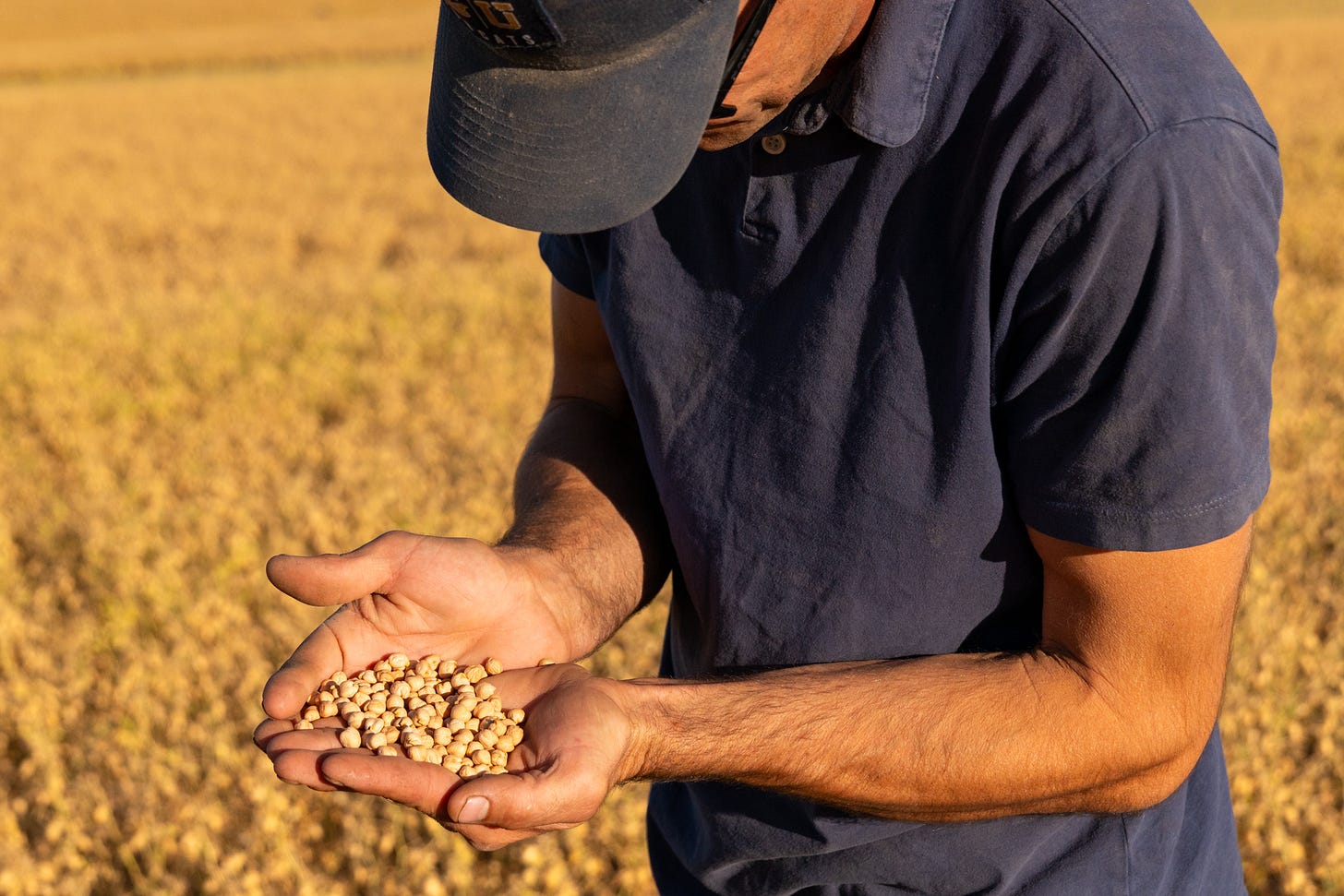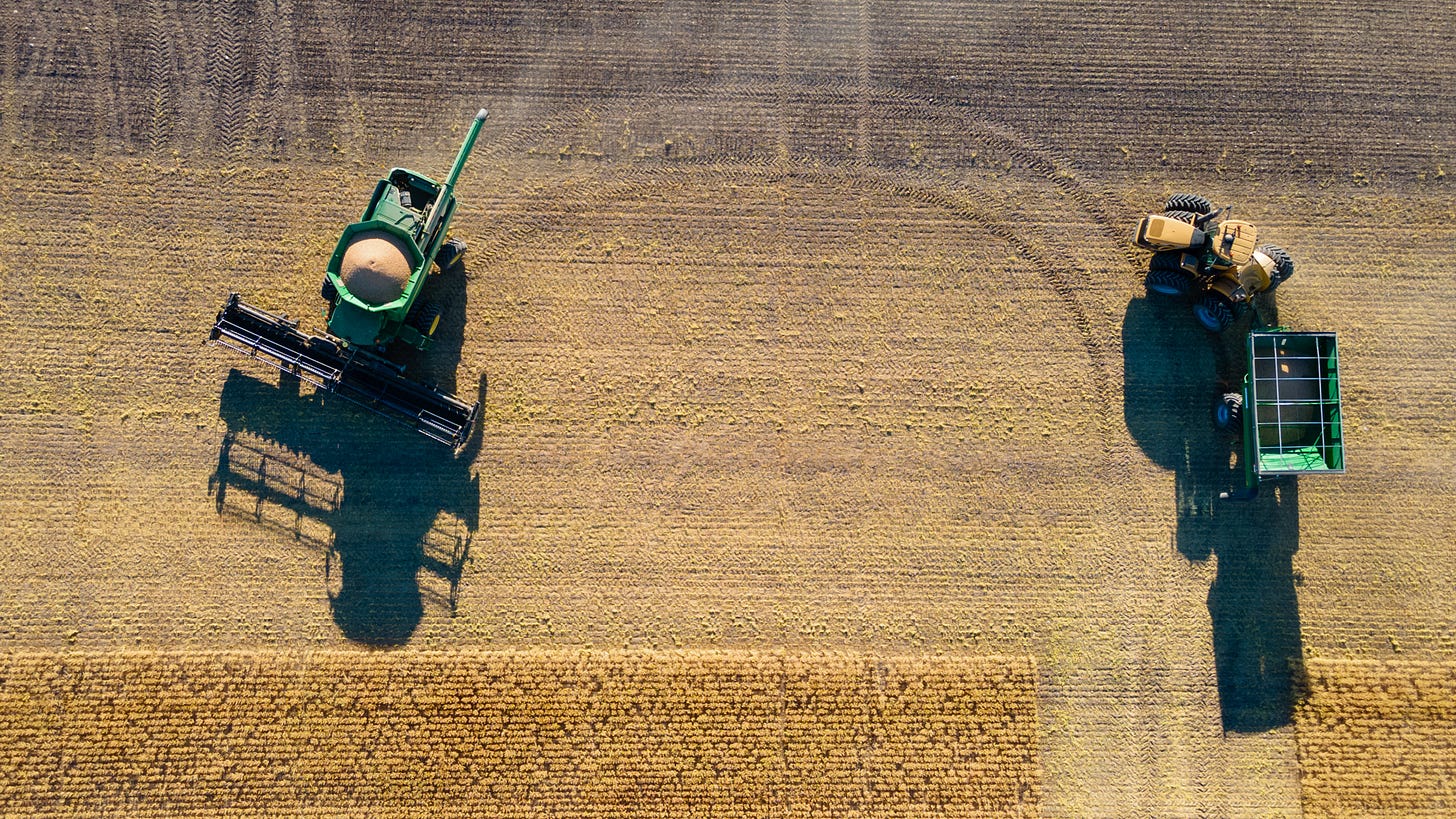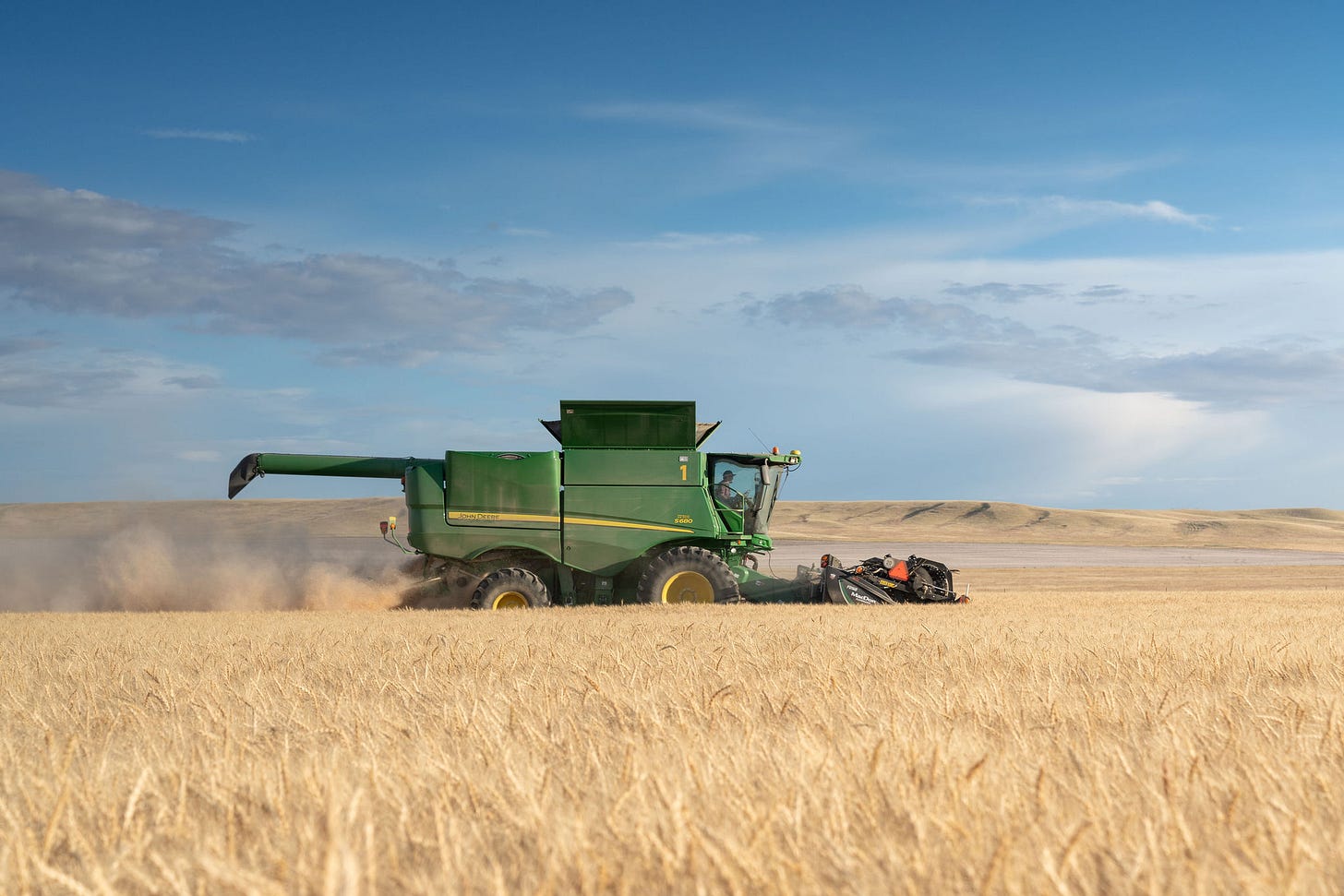Last month, in my “A Day in the Life” post, I shared a fact about wheat: there is no GMO wheat on the market. Several people commented that they didn’t know that, which sparked a great discussion in the comments. I somewhat jokingly said, “I should interview my husband!”
And here we are.
Of course, my husband is only one farmer and one type of farmer. We farm conventionally, not organically. And while reading this, you might disagree with his responses or have more questions than answers.
I shared this sentiment on IG a few years ago, but I’ll also share it here. I’ve had the experience of not growing up in agriculture, but have spent the last 11 years living on a farm. I have seen farming from both sides. What I’ve noticed on social media since marrying a farmer is that some people have a fear of agriculture and their food. And I’m not sure where that comes from. (Some of it comes from intentional fear-mongering with marketing.)
I think many people want to picture a farmer wearing overalls, hoeing his field by hand—the romantic vision of an era gone by. When people see the use of technology in farming, some people have this sudden sense of distrust. They want to see things the “old-fashioned” way. Yet, when a farmer hoed his five acres, he only fed his family. And the farmer next door fed his family.
Today, roughly 97% of the population is fed by the 3% still farming in the U.S. I say this only because, realistically, farmers have had to adapt to new technologies to feed more people.
Doctors do not practice medicine the same way they did 100 years ago, and I think we can all agree that this is a blessing. However, when farmers adopt new technology, some people see it as a bad thing, and they’re wary of their motives.
I tell you this, because food comes families, families like ours.
One of the great things about living in this time is that we have so many options for food. You can raise chickens, buy beef from a local rancher, or buy all your groceries from the store down the street. Or you can do a little bit of all of it. We eat our own beef and eggs from my chickens, but we buy all our other food from the grocery store. Decades ago, raising your own food was the only choice.
I believe it’s a wonderful thing to have so many options.
Of course, we’re just scratching the surface here, and all questions about farming can’t be answered in two posts. I’m happy to try to explain more, and I welcome discussion in the comments!
With that, here’s part one of my interview with my husband, Rich.
Let’s start with an easy one. Who are you? What’s your background? How long have you been farming?
I grew up on my family’s farm and ranch in north-central Montana. I attended Montana State University and received a Master’s in Accountancy degree in 2003. During college, I interned with PricewaterhouseCoopers in Portland, but I decided I wanted to stay in Montana and took a position at an accounting firm in Great Falls.
After a couple of years of working in Great Falls (50 miles from my family farm) and spending summers working at our farm, I decided I wanted to return to the farm full-time in 2006. Now, I manage the grain and farming side of our operation, raising various grain and pulse crops.
I enjoy skiing, fishing, and Bobcat football. I am also a member of the Chouteau County Agriculture Advisory Council and a local advisor for AgWest Farm Credit.
What’s the difference, if any, between organic and non-organic?
Organic production does not allow any synthetic plant food or fertilizers to be used. Organic fertilizer and synthetic fertilizer (used in conventional farming) are chemically the same for the plant (the plant can’t tell the difference if it’s been fertilized with organic or synthetic fertilizer). Nitrogen, for example, can be synthetically produced, and we use it to feed the plants.
Chickpeas and lentils, also known as “pulse crops,” use a symbiotic relationship with specific rhizobia in the soil to produce enough nitrogen for a crop without adding any nitrogen.1
Organic farming does not allow herbicides to remove weeds from crops. However, we choose to use herbicides to remove weeds from our fields because weeds steal food, moisture, and sunshine from the crops.
Organic farming also does not allow any insecticide2 to be used. At the risk of going on and on, a great book to check out is “What a Farmer Wants You to Know About Food.”3
I will add this example of why our operation uses the latest tools to produce the best crop we can. Let's pretend the plants we grow are our children; we feed them fertilizer (food) to grow, use herbicide and fungicide (prescription medication) if they get sick, and at the end of the season, we strive to produce the healthiest most bountiful crop we can using the least amount of medication and other inputs we can. (Herbicides, fertilizer, and fungicides cost money, so most farmers are trying to use the least amount possible.)
Are we perfect? No. However, there is an incredible amount of science surrounding crop production. Ultimately, the tools and knowledge we have available today allow our operation to grow safer food with less energy input (fertilizer, herbicide, fungicide) while improving our soil more now than at any point in our farm’s history.
As an example, we have technology on our sprayer that will target and apply herbicide only to the areas on our land with a growing weed. Sometimes, this reduces the amount of product we use by 99%.
(This is not an ad for John Deere; we don’t have the See & Spray from John Deere; we have a different brand, but it’s similar. But this was a decent video that shows what it does.)
Do farmers get paid more for organic crops? How does that all work?
Again, the book referenced above does a great job of explaining organic production. For our operation, having tried a small amount of organic farming, I find that organic production in our arid4 climate is at odds with protecting our soils and the legacy of our farm.
Organic farmers control weeds primarily through tillage, which we have not done on our farm for over thirty years (we practice no-till farming).5 Tillage exposes the soil to wind and water erosion when it’s not covered with residue. So, for us, tillage is detrimental to our soil.
Organic farming raises about 1/3 of the production that conventional farmers do. Organic farmers are paid more for their crops, but they produce significantly fewer crops, so in a way, they are paid more but grow less.
I’d be curious to know what he thinks of the “dirty dozen” lists for produce.
I had to Google this one. I will say that I am comfortable feeding our family non-organic foods of all kinds.
How has farming taught you to rely more on God? And does believing in God change the way you farm?
Despite all the tools available to our operation to manage finances and operations, it is very apparent in agriculture that many things are out of our ultimate control. This creates a spirit of humility and trust in the future that, to me, is best aligned with our family’s faith in our creator and Lord.
If your question wasn’t answered today, check back tomorrow. I’ll share the rest of the questions and his responses. If you learned something, would you be willing to share the post? Thanks for reading! I’ll be back in your inbox tomorrow. 🌱
Thanks to Western Ventures Photography for all the photos in this post, except the well-known photo of the boys, “You been farming long?”
Say what? I read this and was like, I have no idea what this means. I found this information to explain more if you, like me, don’t know what this means. “Rhizobia are bacteria that form a symbiotic relationship with pulse crops, such as lentils, chickpeas, and peas. The bacteria convert atmospheric nitrogen into ammonia, a nutrient the plants use for growth.” (In short, we don’t have to apply nitrogen fertilizer to pulse crops because they can create it themselves.)
An insecticide is a chemical that kills or controls insects. Insects can destroy or make a crop unhealthy.
This is a great interview with the author of the book, in case you’re not sure you want to buy/read a whole book about farming. Or listen to this podcast episode and decide if you want to buy the book.
We receive 12” or less of precipitation each year.
No-till farming is a farming practice where farmers plant seeds directly into the soil without first tilling or plowing the land, minimizing soil disturbance by using specialized equipment to create a narrow furrow just large enough for the seed, leaving the existing crop residue on the surface to protect the soil from erosion and maintain its health; essentially, it's a method of planting crops with minimal soil disruption, often utilizing cover crops to further enhance soil quality.







Loved this! And as a horticulturist, I appreciate your husband’s unapologetic commitment and trust in the wealth of science behind crop production! The internet is a wild place…so much misinformation. Thankful for your family and all farmers! Looking forward to part 2
Thank you for sharing all of this! I grew up in Iowa and a good part of my family is employed by "conventional farming." My husband runs a very small scale organic vegetable and meat chicken farm. I cannot agree enough that we probably need both, and many of us are blessed with the choice of how we source our food and can do both! Thank you for humanizing large scale farming and just sharing the realities of what is needed to feed people.